Beyond the Smile: Chewing and Brain Health. What Every Dental Marketing Strategy Should Know.
An insightful article on recent discoveries on the link between chewing and brain health & how it can be used for marketing by our director, Kieran. No AI blogs round here, just research, analysis and opinions.
Introduction
Ever thought chewing was just that thing you do before swallowing? Yeah, me too. But apparently, there’s more going on, like, way more.
During a conversation with Dr Amit Kotecha, a renowned oral surgery specialist with 30+ years experience and an avid researcher and KOL for Sweden & Martina and a huge reason why the team at Wise Agency are so knowledgable around the technical aspect of dentistry (which allow us to market dentistry better) he mentioned a few facts about the links between chewing and cognitive function which sparked my intrigue and interest in the subject. My fiance is medical, and I’ve always had a huge interest in how our bodies work – sometimes a little too interested, but that’s for another day.
I got curious and started reading, and wow, there’s actually a decent amount of research out there. It’s not crystal-clear or anything, but enough to raise some eyebrows… especially for dentists.
So today, let’s take a look at chewing (or “mastication,” if you want to sound fancy), how it might tie into brain health, and most importantly, how dental practices can talk about this with patients and in their marketing… without sounding like they’re selling snake oil.

Chewing and Memory: The Simple Version
Think of chewing like a mini workout for your brain. When you chew, your jaw sends signals up through this thing called the trigeminal nerve (I had to Google that, honestly). That signal seems to boost blood flow to brain areas like the hippocampus (which does memory stuff) and the prefrontal cortex (that’s the decision-making part, I think?).
Basically, chewing might give your brain a little wake-up call. Like an espresso shot for your head. But before anyone starts printing “Chewing Prevents Alzheimer’s” on toothbrushes, let’s look at what the research actually shows.
What the Research Says (At Least From What I Could Tell)
A. Studies in Real People
So, some researchers noticed that older adults with fewer than 20 teeth were about 20% more likely to have memory problems than those with 20 or more. Also, it looks like for every tooth lost, your risk of dementia might go up by about 1%. That means losing 10 teeth could, in theory, raise your risk by 10%. Again, this isn’t a guarantee, but it’s what some data points to.
B. Animal and Lab Stuff
In lab tests with rats (yep, poor little guys), the ones that got softer food or lost teeth started losing brain cells linked to memory. And in humans, brain scans have shown that people with fewer teeth and no dentures – seem to have less brain activity than those with all their teeth.
C. Small Pilot Studies
One little study (literally 10 people) gave older adults implant-supported dentures. Nine of them had memory issues to begin with and eight showed improvement afterward. Is that groundbreaking? No. Is it interesting? Definitely.
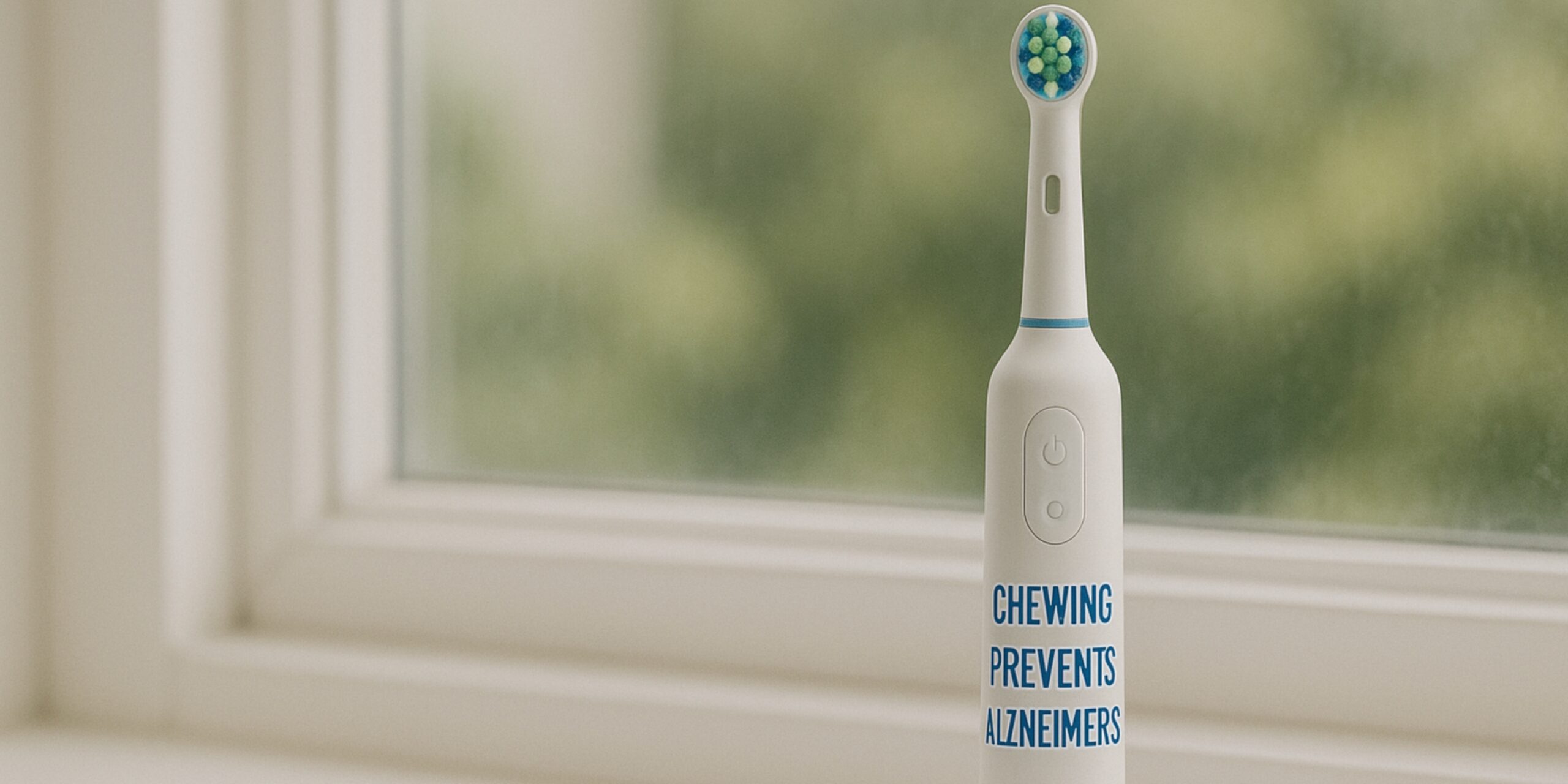
So… Is This Legit? (Kind of. Maybe.)
It’s sort of real. Different types of research; animal studies, scans, human trials – they’re all kind of pointing in the same direction.
But here’s the thing: no one’s totally sure if losing teeth causes the brain stuff, or if they just happen at the same time because of other factors. Like diet, exercise, gum health, social life… there’s a lot going on.
So yeah, better chewing might help your brain. But we’re not saying it’s going to stop Alzheimer’s. That’d be a leap.
How to Use This in Marketing (Now We’re Talking)
This is where you can really stand out as a dental practice – without stepping into sketchy territory. This is also the part where I actually know what I’m talking about (or think I do)
What You Can Say
“Some research suggests that every tooth you lose might raise your dementia risk by about 1%.”
“All-on-4 implants restore your bite and might support brain health, too.”
Use language like might help, may support, etc. And cite your sources. This works great in consent forms, patient seminars, or implant consultations.
What to Avoid
❌ “Implants prevent dementia”
❌ “Lose another tooth and you’ll lose your memory!”
❌ “Miracle cure” anything
Below are some mockup examples which can be followed up with ad-copy.
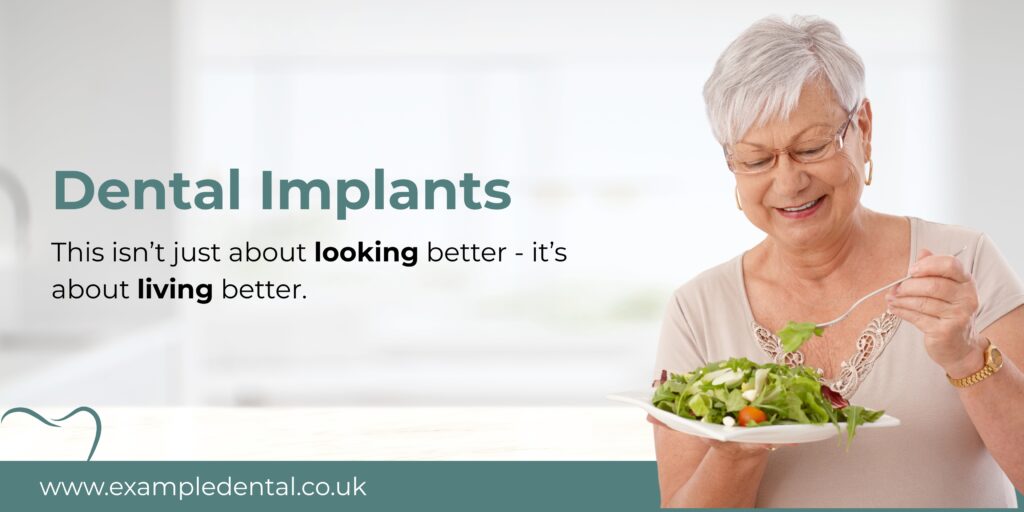
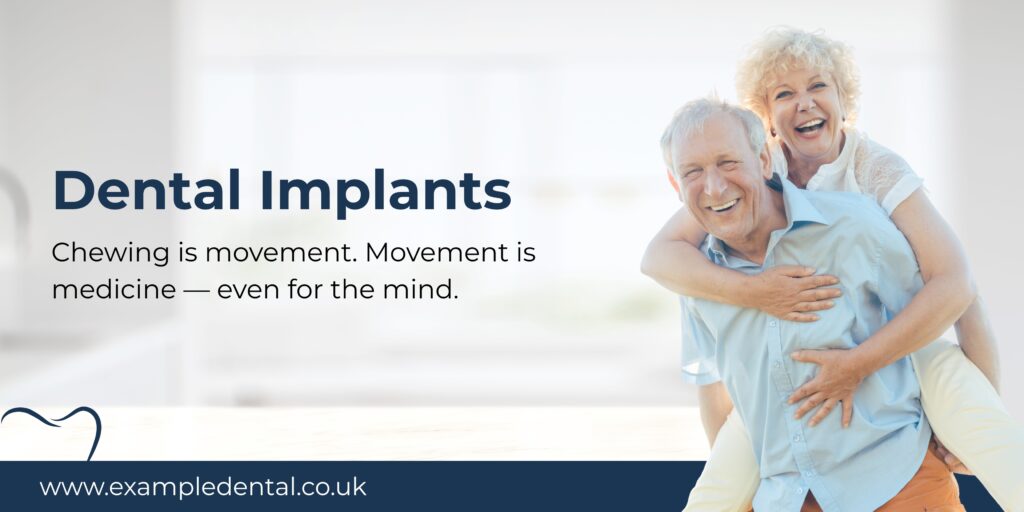
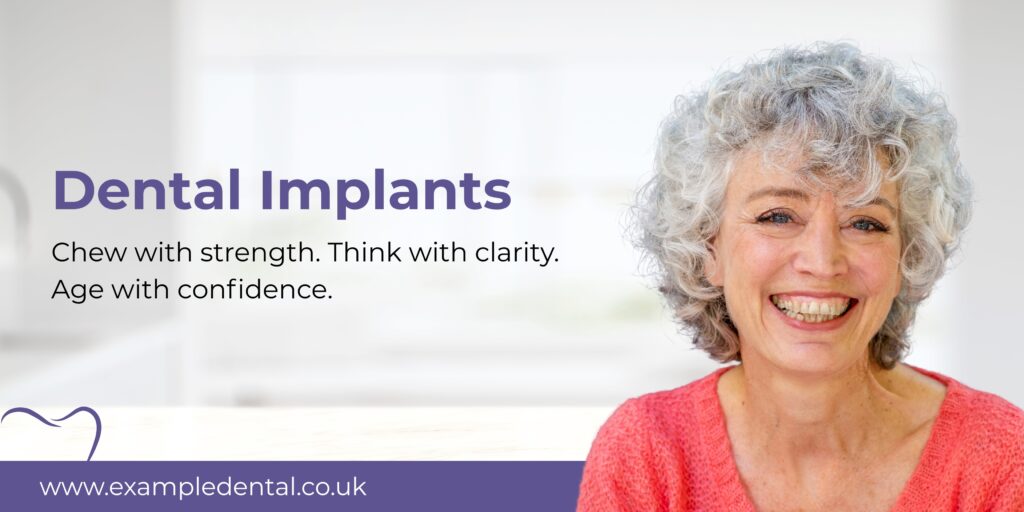
Where You Really Look Like a Pro
This is your sweet spot. Here’s how to make this message work for dental marketing:
All-on-4: Highlight the over 95% long-term success rate, quick smile restoration, and how it supports chewing and bone health.
Implants vs. Dentures: Show how implants help you feel food, unlike old-school dentures.
Cost-Benefit: Yes, there’s an up-front cost, but it pays off in nutrition, potentially better brain health, and less medical care down the road.
Whilst these studies are still on-going, using cases like these are probably better printed within your practice brochure, or a implant information sheet for new implant patients, with citations and references, so patients can’t Chinese whisper your words all the way to the GDC. The same applies for any website copy or ad copy, at this stage, it’s wiser (always smirk when I use this term in a business sense) to include some form of citation or source, than to not. But maybe that’s me being overly cautious.
Why All-on-4 Is a Goldmine
This is the perfect place to focus your messaging.
Over 95% success rate (that’s huge)
Gives patients strong chewing ability again, potentially good for the brain
Fast recovery and solid long-term results
Try this phrasing:
Chewing fuels clarity. Clarity fuels life.
Stronger chewing. Sharper thinking. Deeper living.
Activate your bite. Awaken your mind.
Chew with strength. Think with clarity. Age with confidence.
A balanced bite supports a balanced mind.
Chewing is movement. Movement is medicine — even for the mind.
From bite to brain – align the systems that support you.
Chewing keeps the mind engaged. Every bite matters.
And no, I did not think of all of them myself, 10 points for guessing who helped!
This isn’t just about looking better – it’s about living better. This ethos of marketing a holistic mindset towards teeth, rather than just teeth themselves, is something I’m really trying to orchestrate with the team – inspired by my article (Ha, I sound like such a legitimate author now after 3 blog posts) Biohacking, Cold Showers & Perfect Peters: Why Oral Health Is Still the Most Ignored “Wellness Habit” Out There.
Stay away from:
Fear-based ads (“Don’t let your memory fade!”) or (“Cheaper than a care home”)
Overpromises (“Get MEMORY implants today!”)
The final word
Chewing isn’t just about breaking down your sandwich. It might actually be a brain booster. Every lost tooth could raise your dementia risk by 1%. And while implants like All-on-4 aren’t magic, they do restore chewing and that matters.
Dentists: you’re not just filling gaps. You’re giving patients a real shot at a better, longer life. Use this science in your messaging, whether that’s during patient talks, on your blog, or at your next community seminar.
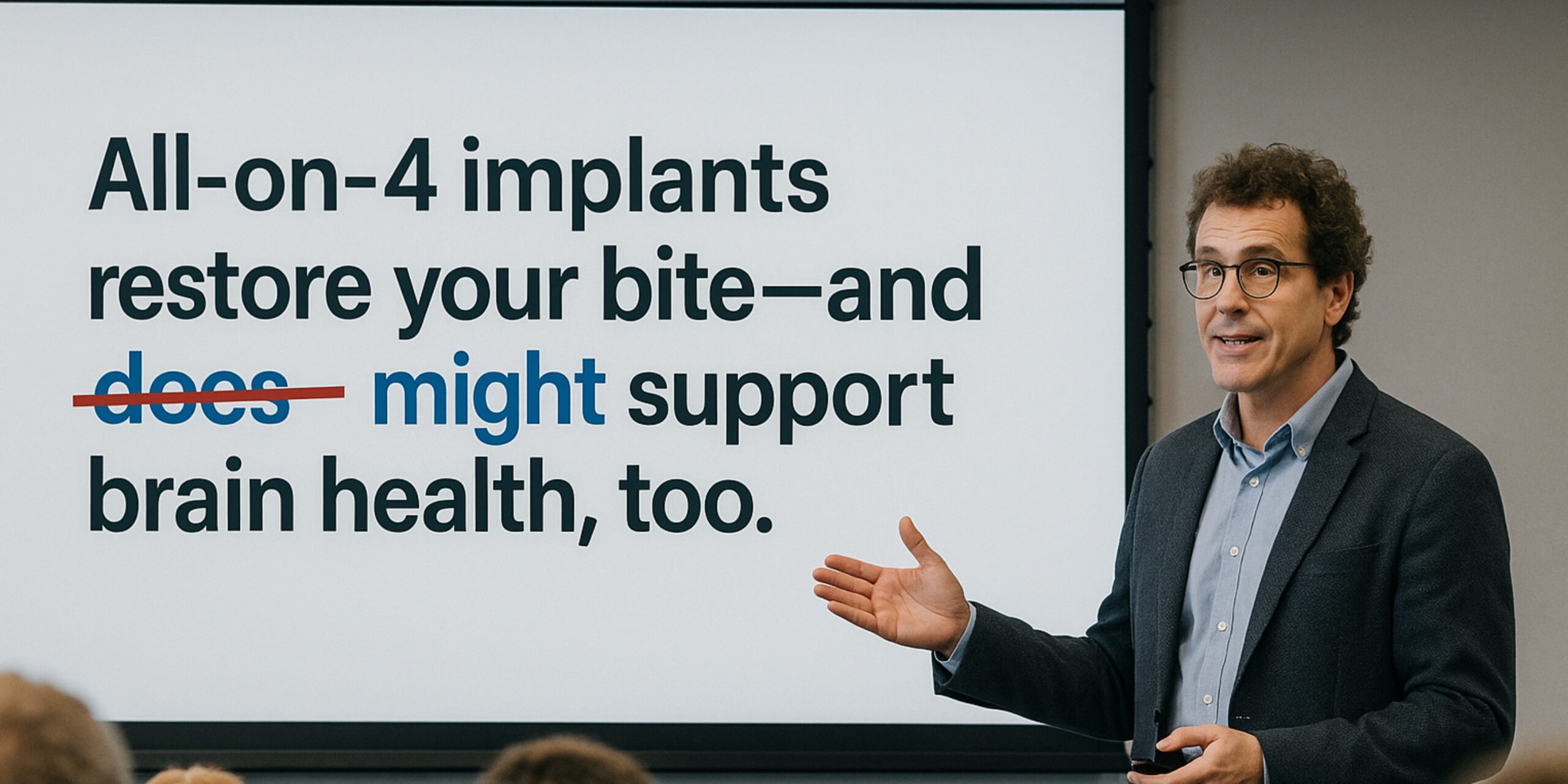
References (I feel like I am back at uni & yes I had to use ai to do them Harvard style)
Chen, H., Iinuma, M., Onozuka, M. & Kubo, K., 2015. Chewing Maintains Hippocampus‑Dependent Cognitive Function. International Journal of Medical Sciences. Available at: PMC [online] frontiersin.org+8pmc.ncbi.nlm.nih.gov+8onlinelibrary.wiley.com+8mdpi.com+5en.wikipedia.org+5pmc.ncbi.nlm.nih.gov+5.
Onozuka, M. et al., 2003. Effect of mastication on regional cerebral blood flow in humans [fMRI study]. Journal of Oral and Maxillofacial Research. journal.adre.ro+1sciencedirect.com+1.
Lin, C.S., 2019. Association between mastication, the hippocampus, and the HPA axis. International Journal of Molecular Sciences, 18(8), p.1687. en.wikipedia.org+8mdpi.com+8pmc.ncbi.nlm.nih.gov+8.
Wei, J. et al., 2021. Tooth loss and the risk of cognitive decline and dementia: A meta‑analysis. Frontiers in Aging Neuroscience, 10, p.415. en.wikipedia.org+9frontiersin.org+9pmc.ncbi.nlm.nih.gov+9.
Ourwid, S., 2019. The effect of missing teeth on dementia in older people. BMC Oral Health, 19(1), p.750. sciencedirect.com+7bmcoralhealth.biomedcentral.com+7agsjournals.onlinelibrary.wiley.com+7.
Oue, T. et al., 2022. Age‑accelerated effect of tooth loss on cognitive function among older adults. Archives of Gerontology and Geriatrics. sciencedirect.com.
Suzuki, M. et al., 2024. Effect of chewing hard material on boosting brain antioxidant levels and cerebral blood flow. Frontiers in Systems Neuroscience. frontiersin.org.
Smith, N., Miquel‑Kergoat, S. & Thuret, S., 2015. The impact of mastication on cognition: Evidence for intervention and hippocampal neurogenesis. Ageing Research Reviews, 23, pp.115–123. journals.sagepub.com+1en.wikipedia.org+1.
Temecula Facial & Oral Surgery, 2023. How Successful Are All-on-4 Dental Implants?. [Online] Available at: frontiersin.org+15temeculafacialoralsurgery.com+15temeculafacialoralsurgery.com+15.
Nobel Biocare, 2025. All-on-4® treatment concept: Clinical Evidence & Survival Rates. [Online] temeculafacialoralsurgery.com+3nobelbiocare.com+3facebook.com+3.
Health Harvard, 2021. Tooth loss associated with cognitive impairment, dementia. Harvard Health Publishing. pmc.ncbi.nlm.nih.gov+3health.harvard.edu+3nyu.edu+3.
NYU, 2021. Tooth loss increases risk of cognitive impairment. NYU News. nyu.edu.
Sciencedirect, 2025. Tooth loss, diet quality, and cognitive decline: A 15‑year longitudinal study. Nutrition, 127, pp.1–8. sciencedirect.com+1onlinelibrary.wiley.com+1.
Meet The Speaker
My name is Kieran, I have been running Wise, our dental marketing agency for 7 year and have a strong interest in dental biology & anatomy and how it can be used to educate patients to make an informed decision.

